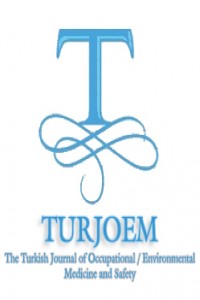NEW APPROACHES TO THE CAUSES OF AUTISM SPECTRUM DISORDERS: CAN ENVIRONMENTAL POLLUTIONS GIVE RISE TO AUTISM?
Abstract
Autism spectrum
disorders (ASD) are characterized by neurodevelopmental differences with
impairment of some intellectual and social abilities as seen persistent
deficits in social communication and social interaction, restricted, repetitive
patterns of behaviours, interests or activities, usually starts on early
childhood in referance to DSM 5. Despite of different subtypes of ASD, the
prevelance is known %1 of the population (similar rates in child and adult
samples). Moreover, the epidemiological studies show that ASD rates has
increased recent years and the etiology of ASD is started to research more
detaily. For all this, information and awareness of ASD have changed
significantly and early intervention treatments has been getting more
important. It is known that genetic (e.g. heredity, shared genes) and biologic
factors (e.g. hormonal differences, immunological abnormalities, brain
deficits) play a causal role for ASD, but higher rates of autism diagnosis draw
attention to the key role of environmental factors (e.g. prenetal and perinatal
factors, infections, inoculations). Exposure
environmental factors directly or indirectly affect the ASD, but new researches
about ASD show the importance of environmetal pollutions especially exposure
air pollution during pregnancy period. Few studies have showed pollution effect
on the ASD significantly
with different ways. Thus, it can be necessary to understand the
associations between various pollutions and autism for treatment modalities. As
a result, how exposures environmental pollution affect the etiology of ASD will
be presented and discussed in this presentation with new approaches.
References
- Merve KOÇAK, Merve VATANSEVER, Hilal KAYA
- Ankara University, Institute of Forensic Sciences, Department of Forensic Psychology
Abstract
References
- Merve KOÇAK, Merve VATANSEVER, Hilal KAYA
- Ankara University, Institute of Forensic Sciences, Department of Forensic Psychology
Details
| Journal Section | Articles |
|---|---|
| Authors | |
| Publication Date | February 16, 2017 |
| Published in Issue | Year 2017 Volume: Volume 2 Issue: İssue 1 (1) - 2.İnternational Congress Of Forensic Toxicology |


